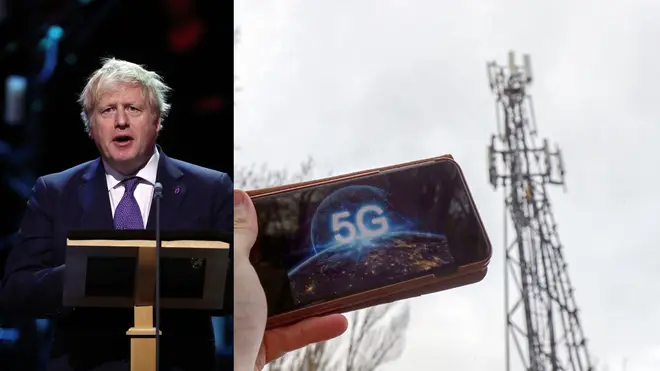
Matthew Wright 7am - 10am
28 January 2020, 16:17 | Updated: 28 January 2020, 16:22

Boris Johnson has granted limited approval for the state-subsidised Chinese tech giant Huawei to roll out 5G technology across the UK.
The Government said that "high-risk vendors" would be excluded from sensitive ‘core’ parts of 5G and gigabit-capable networks.
They also said there would be a 35 per cent cap on high-risk vendor access to non-sensitive parts of the network
Prime Minister Boris Johnson agreed that guidance should be issued by the National Cyber Security Centre stating that high-risk vendors should be:
- Excluded from all safety-related and safety-critical networks in Critical National Infrastructure
- Excluded from security-critical "core" functions, the sensitive part of the network
- Excluded from sensitive geographic locations, such as nuclear sites and military bases
- Limited to a minority presence of no more than 35% in the periphery of the network, known as the access network, which connects devices and equipment to mobile phone masts.
The move comes after a meeting of senior spies and security experts alongside the National Security Council who gave the Prime Minister advice on technical aspects of the involvement of the Chinese tech company in the UK telecom network.
Mr Johnson had faced pressure from the US and some Conservative MPs to block Huawei on the grounds of national security.
The US today said it was “disappointed” by the Government’s decision. The Trump administration threatened to withdraw intelligence co-operation with the UK over the decision.
Analysis: the political problem of Huawei
The implementation of 5G is expected to bring with it download speeds 10 times faster than what 4G currently offers.
Ciaran Martin, the Chief Executive of the National Cyber Security Centre, said: “This package will ensure that the UK has a very strong, practical and technically sound framework for digital security in the years ahead.
“The National Cyber Security Centre has issued advice to telecoms network operators to help with the industry rollout of 5G and full-fibre networks in line with the government’s objectives.
“High-risk vendors have never been – and never will be – in our most sensitive networks.
“Taken together these measures add up to a very strong framework for digital security.”
The Chinese tech company praised the decision, vice-president Victor Zhang said: "Huawei is reassured by the UK Government's confirmation that we can continue working with our customers to keep the 5G roll-out on track.
"This evidence-based decision will result in a more advanced, more secure and more cost-effective telecoms infrastructure that is fit for the future."
The PM has faced down intense pressure from the White House as well as his own backbench MPs.
Over the weekend US Secretary of State Mike Pompeo warned Britain's sovereignty was at risk if Huawei was allowed to be part of the UK's 5G process.
While it has been reported Donald Trump warned Boris Johnson of "serious consequences" if the company was allowed a to go ahead with plans.
It is expected Huawei's involvement will be limited to non-core parts of the network to help ensure the company does not have sole control over any city’s entire 5G network.
The US administration has previously warned allies not to allow Huawei to form part of their 5G networks, claiming it would be a security risk, something the company vehemently denies.
Former national security adviser Peter Ricketts, a crossbench peer, said the risk is being blown out of proportion.
Last year, the US imposed trade restrictions on Huawei over concerns about the company's security and ties to the Chinese government.
Allegations that their telecommunications equipment could be used to spy on people has been repeatedly denied by the tech giant.
Huawei already has significant oversight in the UK, with John Suffolk, head of Huawei’s cybersecurity operation "We are probably the most audited, inspected, reviewed, poked and prodded company in the world.”
An industrial estate on the outskirts of Banbury, is the headquarters of the Huawei Cyber Security Evaluation Centre a partnership between the mobile giant and elements of GCHQ.
The centre works with the Government to "mitigate any perceived risks arising from the involvement of Huawei in parts of the United Kingdom’s (UK) critical national infrastructure."
The HCSEC helps to evaluate Huawei products which are used in the UK telecommunications network.
4G technology began emerging in the late 2000s, bringing with it internet speeds on mobile devices up to 500 times faster than 3G.
5G tech promises data speeds on mobile that go far beyond what is currently on offer even for home broadband customers.
It promises speeds of up to 100gigabits per second - up to 100 times faster than 4G.
5G tech operates outside current 3G and 4G tech so there would not be any issues with bandwith - slow connections caused by too many people logging on at once. 4G can support around 4,000 devices per square kilometre, and 5G can support up to one million.
5G works using a new higher radio frequencies - much higher than any previously developed - that allow it to transfer much more data with much lower latency.